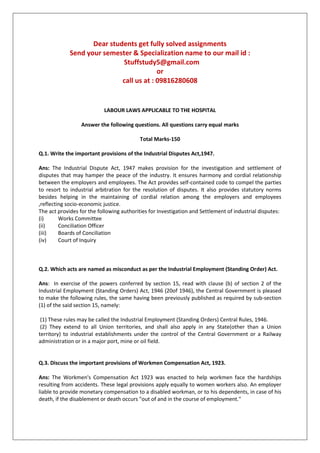
Labour laws applicable to the hospital
- 1. Dear students get fully solved assignments Send your semester & Specialization name to our mail id : Stuffstudy5@gmail.com or call us at : 09816280608 LABOUR LAWS APPLICABLE TO THE HOSPITAL Answer the following questions. All questions carry equal marks Total Marks-150 Q.1. Write the important provisions of the Industrial Disputes Act,1947. Ans: The Industrial Dispute Act, 1947 makes provision for the investigation and settlement of disputes that may hamper the peace of the industry. It ensures harmony and cordial relationship between the employers and employees. The Act provides self-contained code to compel the parties to resort to industrial arbitration for the resolution of disputes. It also provides statutory norms besides helping in the maintaining of cordial relation among the employers and employees ,reflecting socio-economic justice. The act provides for the following authorities for Investigation and Settlement of industrial disputes: (i) Works Committee (ii) Conciliation Officer (iii) Boards of Conciliation (iv) Court of Inquiry Q.2. Which acts are named as misconduct as per the Industrial Employment (Standing Order) Act. Ans: In exercise of the powers conferred by section 15, read with clause (b) of section 2 of the Industrial Employment (Standing Orders) Act, 1946 (20of 1946), the Central Government is pleased to make the following rules, the same having been previously published as required by sub-section (1) of the said section 15, namely: (1) These rules may be called the Industrial Employment (Standing Orders) Central Rules, 1946. (2) They extend to all Union territories, and shall also apply in any State(other than a Union territory) to industrial establishments under the control of the Central Government or a Railway administration or in a major port, mine or oil field. Q.3. Discuss the important provisions of Workmen Compensation Act, 1923. Ans: The Workmen's Compensation Act 1923 was enacted to help workmen face the hardships resulting from accidents. These legal provisions apply equally to women workers also. An employer liable to provide monetary compensation to a disabled workman, or to his dependents, in case of his death, if the disablement or death occurs "out of and in the course of employment."
- 2. Any worker employed in any of a wide variety of hazardous occupations who has suffered an injury is eligible for compensation. If he dies, his dependents can claim the benefits provided by the Act. The injury must disable him for more than 3 days, totally or partially. The disablement means the loss in the earning capacity of a workman in every employment which he was capable of doing at the time of the accidents. Its effect may be temporary or permanent (Schedule 1). To get compensation for an occupational disease, a workman must have been employed in the specified occupation for a continuous period of at least 6 months. If the Q.4. Write notes on a. Benefits under The Maternity Benefit Act, 1961 b. Fixing of Minimum Rates of Wages. Ans: a. Benefits under The Maternity Benefit Act, 1961: The Maternity Benefit Act, aims to regulate of employment of women employees in certain establishments for certain periods before and after child birth and provides for maternity and certain other benefits. Employment of or work by, women prohibited during certain periods.(I) No employer shall knowingly employ a woman in any establishment during the six weeks immediately following the day of her delivery, 1[miscarriage or medical termination of pregnancy]. (2) No women shall work in any establishment during the six weeks immediately following the day of her delivery 2[miscarriage or medical termination b. Fixing of Minimum Rates of Wages: The Minimum Wages Act, 1948 is an Indian legislation enacted by the Parliament of India for statutory fixing of minimum wages to be paid to skilled and unskilled labours. The Indian Constitution has defined a 'living wage' that is the level of income for a worker which will ensure a basic standard of living including good health, dignity, comfort, education and provide for any contingency. However, to keep in mind an industry's capacity to pay the constitution has defined a 'fair wage The Act provides for fixing wage rate (time, piece, guaranteed time, overtime) for any industry that has at least 1000 workers. 1) While fixing hours for a normal working day as per the act should make sure of the following: The number of hours that are to be fixed Q.5. Write in short the important provisions of a. Payment of Bonus Act, 1965. b. Payment of Gratuity Act, 1972 Ans: a. Payment of Bonus Act, 1965. The Payment of Bonus Act, 1965 was enacted to provide for the payment of bonus to persons employed in certain establishments on the basis of profits or productivity and for the matters connected therewith. The Act applies to:(i) every factory as defined under the Factories Act, 1948; and
- 3. (ii) every other establishment in which twenty or more persons are employed on any day during an accounting year. However, the Government may, after giving two months' notification in the Official Gazette, make the Act applicable to any factory or establishment employing less than twenty but not less than ten persons. b. Payment of Gratuity Act, 1972: There are many legal provisions of the Payment of Gratuity Act 1972. We are below discussing some important provisions of the Act. i) Provisions relating to the payment of gratuity :Under sections 4 and 7 of the Act , different provisions relating to the payment of gratuity are given According to Section 4(1), the gratuity shall be payable to an employee on the termination of his employment after he has rendered continuous service for not less than 5 years. The gratuity is payable to an employee on his termination in the following casesa) On his superannuation, or Dear students get fully solved assignments Send your semester & Specialization name to our mail id : Stuffstudy5@gmail.com or call us at : 09816280608
